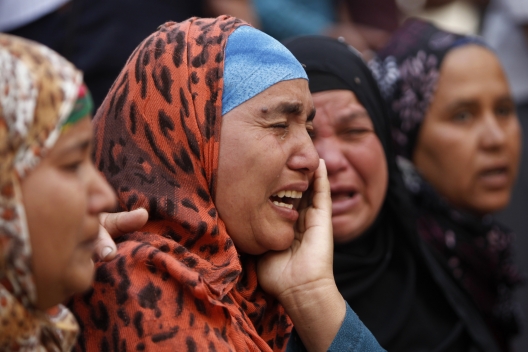 Yesterday’s mass death sentence for supporters of ousted president Mohamed Morsi by a local judge in Egypt sparked an uproar among Egyptian activists and international observers. Another judge also banned the April 6 Youth Movement, a key revolutionary actor in the January 2011 uprising. A number of NGOs in Egypt have condemned the rulings and the US State Department spokesperson Jen Psaki released a statement urging the reversal of the death sentences as they completely ignore due process guarantees. Egyptian Foreign Minister Nabil Fahmy, speaking in Washington DC, defended the verdicts as part of an independent judicial process that must be completed before others condemn the outcome. How did a once widely trusted institution reach this state of affairs?
Yesterday’s mass death sentence for supporters of ousted president Mohamed Morsi by a local judge in Egypt sparked an uproar among Egyptian activists and international observers. Another judge also banned the April 6 Youth Movement, a key revolutionary actor in the January 2011 uprising. A number of NGOs in Egypt have condemned the rulings and the US State Department spokesperson Jen Psaki released a statement urging the reversal of the death sentences as they completely ignore due process guarantees. Egyptian Foreign Minister Nabil Fahmy, speaking in Washington DC, defended the verdicts as part of an independent judicial process that must be completed before others condemn the outcome. How did a once widely trusted institution reach this state of affairs?
Ryan J. Suto, an independent analyst on the rule of law in the Middle East, chronicles the politicization of the Egyptian judiciary since the January 2011 uprising and the impact of this shift on its image as an impartial arbiter of the law. In his latest article on EgyptSource, Suto outlines the adversarial relationship that developed between the judiciary and the Muslim Brotherhood’s Morsi regime as each side tried to shape the transition. With Morsi’s ouster, the judiciary reinforced the new interim regime’s use of unconstitutional laws to exact revenge on their political adversaries. The result, Suto argues, is the self deligitimization of the Egyptian judiciary as a neutral player and a dangerous undermining of the rule of law as conflicting actors search for other means to resolve disputes – including increased violence.
Read Suto’s full article, “Proven Guilty: Egypt’s Judiciary and the Undermining of Democracy” on EgyptSource.
Image: Photo: Relatives and families of Muslim Brotherhood members and supporters of ousted President Mohamed Mursi react in front of the court in Minya, south of Cairo, after hearing the sentence handed to Muslim Brotherhood leader Mohamed Badie and other Brotherhood supporters April 28, 2014. An Egyptian court handed down a death sentence to Badie, the Brotherhood's general guide, and 682 supporters. REUTERS/Mohamed Abd El Ghany
